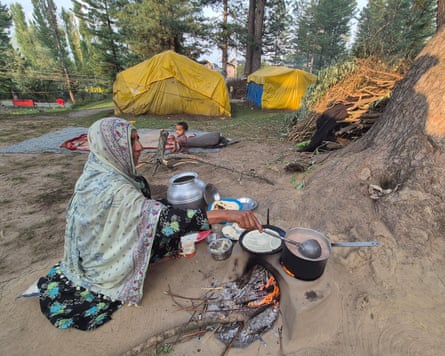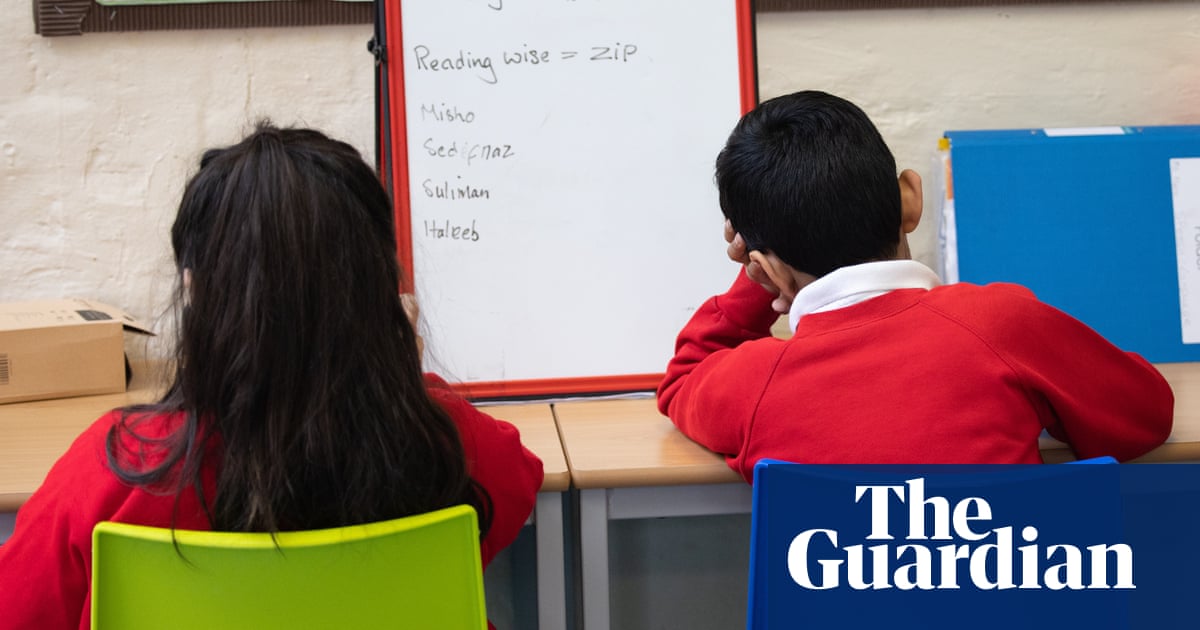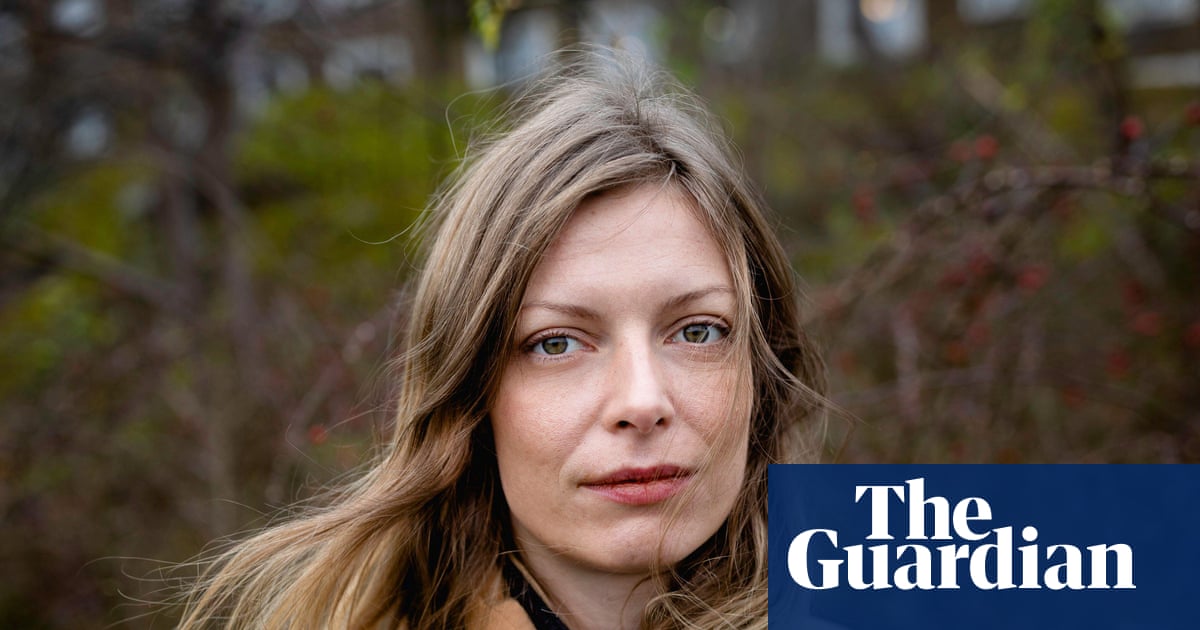Dawn had just broken across the trail through the Pir Panjal mountains when Fatima Deader felt the first labour pains. She and her family had almost reached the midway point of their 134 mile (215km) trek from Rajouri in Jammu to Kashmir’s higher pastures. Mist clung to the forest, and the ground was slick beneath the feet of the caravan of about 70 pastoralists who had stopped to camp together the previous night.
A week from her due date, she had been travelling on horseback and assumed the discomfort she felt was fatigue – until pain tore through her body.
“There was no clinic, no nurse, no doctor,” Deader, 23, says. Only her mother and a midwife, Saira Begum, were with her in a damp canvas tent, whispering prayers. Hours after her son was born, and still weak and bleeding, Fatima had to ride again, her baby carefully tied to the horse with her, as the group’s journey continued through dense forest, home to tigers and bears.
The 3,500-metre-high Pir Panjal pass, also called Peer Ki Gali, connects the Jammu region to the Kashmir valley via the centuries-old Mughal Road, and each year when the snow melts, nearly a million nomadic Gujjar and Bakarwal herders set out with their goats, sheep and horses on journeys that can last months.

For those who are pregnant during the migration, heavy loads still have to be carried, and rest found in tents pitched on wet ground. Babies are born under trees, by riverbanks or in forest shelters.
Some women give birth after days without a proper meal. Those who make it to district hospitals often arrive exhausted, anaemic or suffering from an infection.
Fozia Choudhary was 16 when she gave birth in 2016. “I was still a child myself,” she says. Married to her cousin at 14 – early marriage is common among tribal families – she often had nothing to eat but a cup of milk and a single roti flatbread each day. By the time she went into labour, she was dangerously weak.
Choudhary was one of the lucky ones who made it to hospital, but doctors were shocked at her condition. “They shouted at my husband, asking how I had even survived this long,” she says.
The teenager required a blood transfusion – “four bottles” – before she could safely deliver the baby. Recovery was slow and painful.
For such women, survival often depends on traditional midwives. At 63, Begum has helped deliver dozens of babies along the mountain routes. “Sometimes there is so much blood loss we can’t save the mother,” she says.
“I remember [a woman called] Gulnaz. We were in Doodhpathri, high in the hills, in 2021. The nearest hospital was six miles away and we had no food or water left. She was eight months pregnant, already sick with a liver problem. She died there, before we could get her any help.

“We have only the knowledge passed down to us – no medicines, no doctor,” she adds. “If I fall sick or grow too old, who will help these women?”
A 2022 government study estimated Jammu and Kashmir’s maternal mortality ratio (MMR) – the number of women dying from pregnancy-related causes per 100,000 live births – to be 46, better than India’s national figure and well below the global average of 224 deaths. But these numbers obscure the experiences of nomadic women, whose lives largely go undocumented in official health data.
Dr Mushtaq Wani, a public health researcher in Srinagar who works with nomadic communities, says: “The state’s MMR figures come from hospital deliveries. Women on migration routes rarely reach clinics in time, so preventable deaths go unrecorded.”
Kashmiri political leader Yasin Malik says that for decades, successive administrations in the territory have promised mobile healthcare for Gujjar and Bakarwal women, but support has never materialised.
after newsletter promotion

A senior Jammu and Kashmir government health official, who wanted to remain anonymous, admitted that staffing, funding and the terrain made medical support difficult.
District hospital doctors confirm the consequences. “Many women arrive after walking or riding 10-15km in labour,” says a doctor in Baramulla, who also requested anonymity. “By the time they reach us, it is often too late to prevent complications, or even to save the mother. Severe anaemia, infections and obstructed labour are common.”
The gap in healthcare is compounded by poverty, early marriage and malnutrition. Many women, particularly girls who married young, enter pregnancy undernourished and physically underdeveloped, which increases the risk of maternal and neonatal complications.
International organisations say this is not unique to the region. The UN Population Fund (UNFPA) notes similar patterns among pastoralist women in other countries where migration routes leave those facing childbirth out of reach of conventional healthcare. Pilot projects in Mongolia, Ethiopia and Somalia have attempted to address the lack of resources for nomadic women.
In Mongolia, an outreach initiative using mobile clinics – part of a broader health programme supported by the World Health Organization (WHO) targeting remote communities – provide preventive care and ultrasound scans to herders in areas many hours from clinics.
Ethiopia’s mobile health programme in the Afar and Somali regions delivers antenatal, immunisation and nutrition services to hard-to-reach pastoralist communities through travelling health teams.

Back in the forest, Begum folds her cloths after helping another young woman deliver her baby. “What else do you have in the jungles, except an old woman’s hands?” she asks.
The new mother, Fatima, rocks her newborn by the glow of a fire, echoing her sentiment. “We survive by luck,” she says. “But every year, another woman does not.”

 2 months ago
50
2 months ago
50

















































